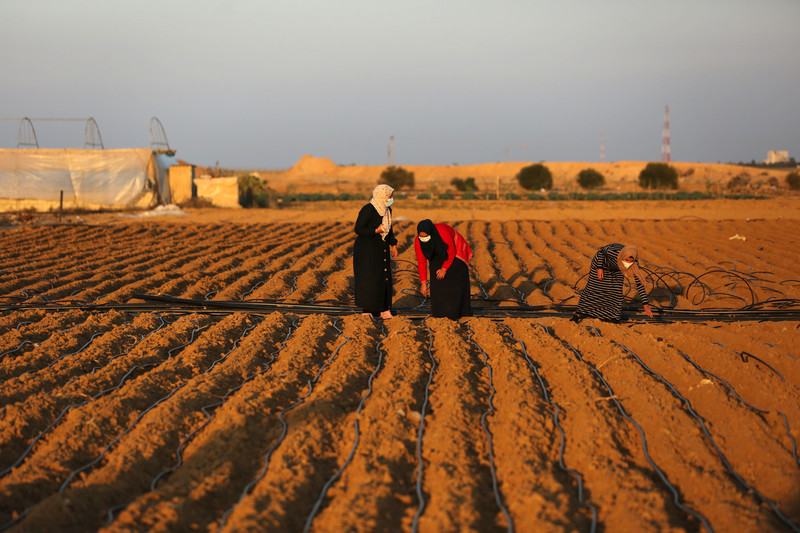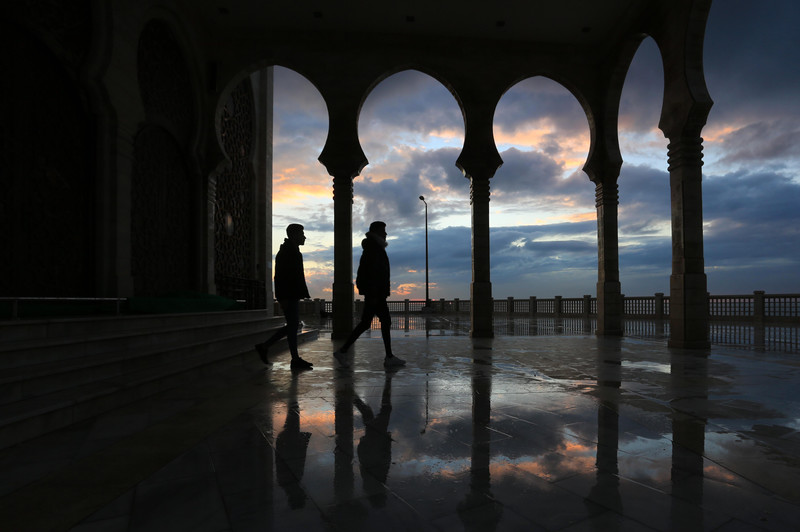Source: Electronic Intifada
The 47-year-old’s land is in the town of Beit Lahia in the northern Gaza Strip and adjacent to the barrier separating Gaza and Israel.
At some point, he and his oldest son, Sameeh, 22, noticed Israeli soldiers in three bulldozers heading toward their lands. They didn’t imagine they would destroy their agricultural land.
“We were shocked when they approached and started bulldozing the lands. We tried to stop them by holding up white flags, but they didn’t,” Qaadan told The Electronic Intifada.
They also, he said, took their time, digging, leveling and flattening.
“They started at 10 am and finished at 5 pm,” Qaadan said.
They used those seven hours to level 5,000 square meters of the land. Almost his entire strawberry crop – one of a handful of agricultural goods Gaza is able to sell outside its boundaries under Israeli restrictions that have seen exports drop to just 17 percent today of what they were before 2007 – was destroyed.
According to an early 2021 report from Al Mezan, a human rights group, entitled “Farming in a Buffer Zone,” the total area of farmland affected by Israeli military leveling operations over the two years between 2018 and 2020 was over a million square meters.
And every meter hurts.
“I cannot describe the pain of having to wake up every morning and see all we built and our livelihood destroyed,” Qaadan said.
The farmer said he now had to replace what was destroyed – including irrigation pipes and wires used to tighten plastic on top of crops, all unexpected costs he can barely afford – and put in extra hours just to get the land back to where it was.
“The tanks and bulldozers deliberately moved the soil from one place to another during the bulldozing process, which caused large holes that will require effort and time to level again.”
He is convinced that the Israeli military is targeting farmers’ livelihoods, citing the timing, in the middle of the important strawberry season.
Strawberries, known locally as “red gold,” are an important crop for Gaza’s farmers. The season is long, beginning in September with the planting of seedlings and ending in April the following year.
“This is not the first attack, and it was preceded by another incursion on my land five years ago. Then, the bulldozers swept away a smaller area, but inflicted losses that exceeded $5,000 at the time.”
According to Al Mezan data, Israeli troops carried out 206 incursions throughout the five districts of the Gaza Strip between 2018 and 2020 – or a bit more than one raid per week.
The estimated total cost of the damage to Qaadan’s land was approximately $16,000 according to the farmer, who is seeking compensation from Gaza’s authorities and through human rights groups from Israel.
Luck, in a relative way
Yusri Arafat, 22, is a farmer and a father of two young children. He started farming when he was 10 by helping his father out.
On 25 December, two days after the bulldozers came for Qaadan’s land, Yusri was heading to his olive farm near the boundary fence in Johr al-Deek in the central Gaza Strip.
While picking olives, soldiers suddenly started shooting in the direction where he was working.
Chaos ensued. Yusri heard screaming from fellow olive pickers. Past incidents, especially one from 2014 when a friend was killed in similar circumstances during the harvest, ran through his mind, he told The Electronic Intifada.
He jumped to the ground and flattened himself. His hat came off, landing a few feet away.
Sometimes, your luck is in. Twice, he said, soldiers shot the hat.
Shaken, Yusri and friends eventually made it home. He stayed there for days.
“I was in a total panic. I stayed in bed for four consecutive days,” he said.
His father Jalal, 49, said he was really scared when he saw his son.
“He came back to the house early and he did not speak. He was traumatized by the action.”
Jalal himself used to work near the boundary and has bitter experience with Israel’s military.
He said he had land near the boundary that was completely destroyed in 2009 and again in 2012.
The destruction in 2009 was particularly costly. The family lost almost $25,000 as their irrigation system, irrigation wells, herbicides, motors and farming tools were all destroyed, Jalal said.
Yusri has a degree in Arabic from the Islamic University of Gaza. He has options, though due to Gaza’s disastrous job market not many. In fact, despite his degree, he decided to work in agriculture.
But he has no intention of jeopardizing his life to provide for his family. His father supports him in this decision.
“I would never sacrifice the life of my son,” Jalal told The Electronic Intifada.
Yusri is now working on a farm far away from the boundary fence with minimum wage to ensure his life.
Both he and his father are conscious of the fact that they’ve lost far more than irrigation systems or crops. They’ve lost the right to farm their own land.
“This is another way for Israel to steal our land,” Jalal said. “They are sabotaging our agriculture and our farms. Farms have never been a threat to the Israelis.”
Targeting the soil
Mihyar al-Najjar, 34, is a farmer and shepherd who plants wheat on his land in Khuzaa in Gaza’s southeast. During Israel’s military assault on Gaza in May, last year, the bombing was so intensive that his wheat harvest caught fire.
He lost more than his crop. The farm is the only source of income for his family. And with the lands near the boundary suffering both from tear gas attacks, during last May’s Israeli aggression, as well as aerial herbicide spraying by the Israeli military, the earth itself is being slowly poisoned.
As Al Mezan documented in its report, the periodic use of aerial herbicides by the Israeli military on Palestinian farmers’ crops means soil in the boundary zones are in danger of becoming permanently damaged and unfit for farming.
In the past three months, al-Najjar’s neighbor, Jaber Abu Sammour, 46, has been trying to grow wheat on his land, but to no avail. The farmers say this is due to toxic herbicides and they also say Israel used phosphorous bombs during the last war on Gaza in May, which, if true – Israel denies it – would also pollute the soil.
Gaza’s ministry of agriculture offers help to farmers who need to rehabilitate their land. But in the face of widespread need, there is only so much the ministry can do.
“The ministry is offering services to all farmers,” al-Najjar told The Electronic Intifada, “but we have a lot of problems and it cannot fix all of them at once.”
Farmers, he said, need fertilizers that have become too expensive as a result of Israeli restrictions. Israel considers fertilizers to be a so-called dual use product and therefore heavily limits their entry to Gaza.
Neither climate change nor war are good for agriculture, he said.
For now, al-Najjar is selling his produce at low prices to recoup as much as possible as quickly as possible. But, he said, he wasn’t looking for any support.
“We do not need any cash help,” al-Najjar said. “We need the Israeli military to stop what it’s doing and let us live.”
Meanwhile, farmers have had to adapt. Crops such as tomatoes are costly and farmers are no longer willing to grow them near the boundary.
According to Gisha, an Israeli human rights organization, the cost of growing 1,000 square meters of tomatoes is some $1,500. From this, farmers can expect slightly over $600 in profit.
Growing spinach on the same size area costs only some $280 but also yields a smaller profit.
In addition, farmers try to grow only short crops like parsley, radishes and potatoes. Tall crops may incur the wrath of the Israeli military and would likely be leveled by bulldozers.
“Everything that is happening to our farm land leads to just one conclusion,” said al-Najjar. “They do not want us to plant the land or provide for our families.”
He, and other farmers interviewed for this article, remain defiant.
“We have planted our land and we will continue to plant our land because this is what we do. This is what our ancestors did. And this is what our descendants shall carry on doing.”
Yasmin Abusayma is a freelance writer and translator from Gaza, Palestine.
Shortlink for this post: https://daysofpalestine.ps/?p=30678








